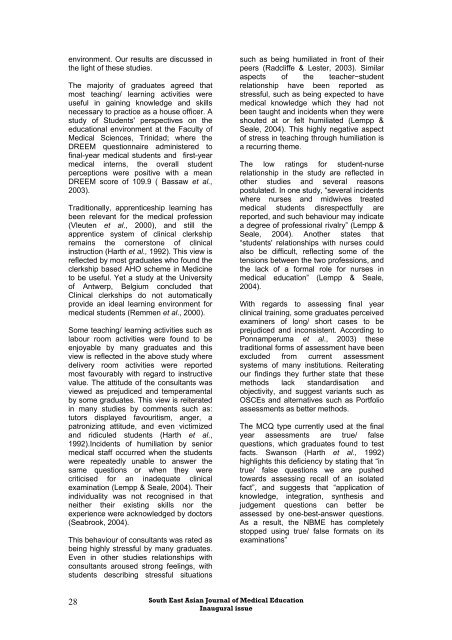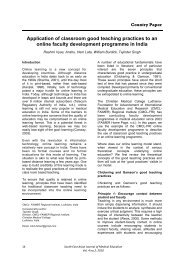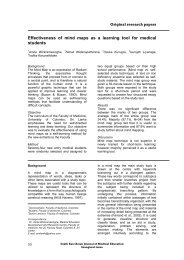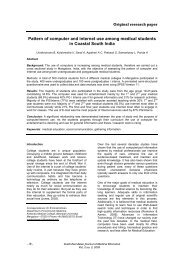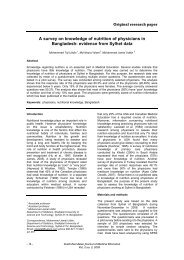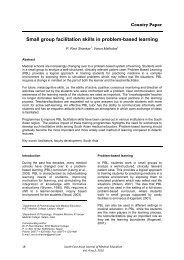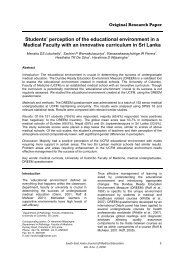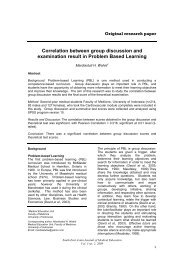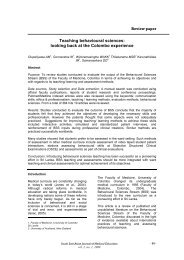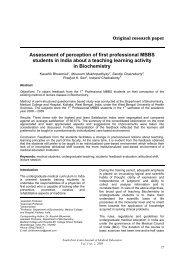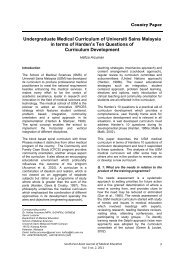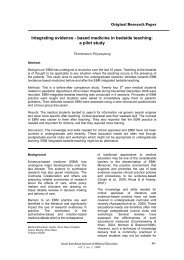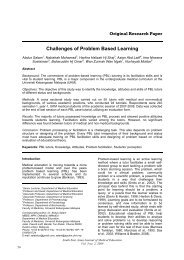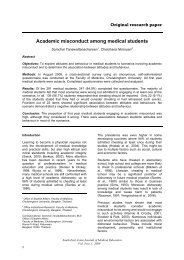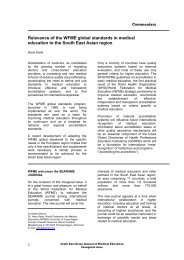environment. Our results are discussed inthe light <strong>of</strong> these studies.The majority <strong>of</strong> graduates agreed thatmost teaching/ learning activities wereuseful in gaining knowledge and skillsnecessary to practice as a house <strong>of</strong>ficer. Astudy <strong>of</strong> Students' perspectives on theeducational environment at the Faculty <strong>of</strong><strong>Medical</strong> Sciences, Trinidad; where theDREEM questionnaire administered t<strong>of</strong>inal-year medical students and first-yearmedical interns, the overall studentperceptions were positive with a meanDREEM score <strong>of</strong> 109.9 ( Bassaw et al.,2003).Traditionally, apprenticeship learning hasbeen relevant for the medical pr<strong>of</strong>ession(Vleuten et al., 2000), and still theapprentice system <strong>of</strong> clinical clerkshipremains the cornerstone <strong>of</strong> clinicalinstruction (Harth et al., 1992). This view isreflected by most graduates who found theclerkship based AHO scheme in Medicineto be useful. Yet a study at the University<strong>of</strong> Antwerp, Belgium concluded thatClinical clerkships do not automaticallyprovide an ideal learning environment formedical students (Remmen et al., 2000).Some teaching/ learning activities such aslabour room activities were found to beenjoyable by many graduates and thisview is reflected in the above study wheredelivery room activities were reportedmost favourably with regard to instructivevalue. The attitude <strong>of</strong> the consultants wasviewed as prejudiced and temperamentalby some graduates. This view is reiteratedin many studies by comments such as:tutors displayed favouritism, anger, apatronizing attitude, and even victimizedand ridiculed students (Harth et al.,1992).Incidents <strong>of</strong> humiliation by seniormedical staff occurred when the studentswere repeatedly unable to answer thesame questions or when they werecriticised for an inadequate clinicalexamination (Lempp & Seale, 2004). Theirindividuality was not recognised in thatneither their existing skills nor theexperience were acknowledged by doctors(Seabrook, 2004).This behaviour <strong>of</strong> consultants was rated asbeing highly stressful by many graduates.Even in other studies relationships withconsultants aroused strong feelings, withstudents describing stressful situationssuch as being humiliated in front <strong>of</strong> theirpeers (Radcliffe & Lester, 2003). Similaraspects <strong>of</strong> the teacher−studentrelationship have been reported asstressful, such as being expected to havemedical knowledge which they had notbeen taught and incidents when they wereshouted at or felt humiliated (Lempp &Seale, 2004). This highly negative aspect<strong>of</strong> stress in teaching through humiliation isa recurring theme.The low ratings for student-nurserelationship in the study are reflected inother studies and several reasonspostulated. In one study, “several incidentswhere nurses and midwives treatedmedical students disrespectfully arereported, and such behaviour may indicatea degree <strong>of</strong> pr<strong>of</strong>essional rivalry” (Lempp &Seale, 2004). Another states that“students' relationships with nurses couldalso be difficult, reflecting some <strong>of</strong> thetensions between the two pr<strong>of</strong>essions, andthe lack <strong>of</strong> a formal role for nurses inmedical education” (Lempp & Seale,2004).With regards to assessing final yearclinical training, some graduates perceivedexaminers <strong>of</strong> long/ short cases to beprejudiced and inconsistent. According toPonnamperuma et al., 2003) thesetraditional forms <strong>of</strong> assessment have beenexcluded from current assessmentsystems <strong>of</strong> many institutions. Reiteratingour findings they further state that thesemethods lack standardisation andobjectivity, and suggest variants such asOSCEs and alternatives such as Portfolioassessments as better methods.The MCQ type currently used at the finalyear assessments are true/ falsequestions, which graduates found to testfacts. Swanson (Harth et al., 1992)highlights this deficiency by stating that “intrue/ false questions we are pushedtowards assessing recall <strong>of</strong> an isolatedfact”, and suggests that “application <strong>of</strong>knowledge, integration, synthesis andjudgement questions can better beassessed by one-best-answer questions.As a result, the NBME has completelystopped using true/ false formats on itsexaminations”28<strong>South</strong> <strong>East</strong> <strong>Asian</strong> <strong>Journal</strong> <strong>of</strong> <strong>Medical</strong> <strong>Education</strong>Inaugural issue
Conclusion and recommendationsThe learning environment <strong>of</strong> the final yearteaching programme prepared a graduatefor future practice with effective learningmethods. However the learningenvironment needs improvement as someaspects contribute to increased levels <strong>of</strong>stress and do not promote healthy lifestyles. Teaching sessions andassessments should be conducted basedon adult learning principles.ReferencesBassaw, B., R<strong>of</strong>f, S., McAleer, S., Roopnarinesingh,S., De Lisle, J., Teelucksingh, S. & Gopaul, S.,(2003) Students' perspectives on the educationalenvironment, Faculty <strong>of</strong> <strong>Medical</strong> Sciences, Trinidad,<strong>Medical</strong> Teacher, 25(5) pp. 522-6Case, S.M., & Swanson, D.B. (2002) Constructingwritten test questions for the basic and clinicalsciences, National Board <strong>of</strong> <strong>Medical</strong> Examiners,Philadelphia, USA.Clarke, R.M., Feletti, G.I. & Engle, C.E. (1984)Students Perceptions <strong>of</strong> the Learning Environment ina New <strong>Medical</strong> School, <strong>Medical</strong> <strong>Education</strong>,18, pp.321- 5Faculty <strong>of</strong> Medicine (2000) Student Handbook1999/2000, Faculty <strong>of</strong> Medicine, University <strong>of</strong>Colombo, Sri Lanka.Faculty <strong>of</strong> Medicine (2004a) Pr<strong>of</strong>essorial UnitMedicine clinical attachment programme book,Faculty <strong>of</strong> Medicine, University <strong>of</strong> Colombo, SriLanka.Faculty <strong>of</strong> Medicine (2004b) Reproductive healthmodule Hand book for module and clinical training.Department <strong>of</strong> Obstetrics and Gynaecology, Faculty<strong>of</strong> Medicine, University <strong>of</strong> Colombo.Faculty <strong>of</strong> Medicine (2004c) The Curriculum <strong>of</strong> theFaculty <strong>of</strong> Medicine University <strong>of</strong> Colombo, SriLanka.Genn, J.M. (2001) Curriculum, environment, climate,quality and change in medical education: a unifyingperspective, <strong>Medical</strong> Teacher, 23(4) pp. 337–44Harth, S.C., Bavanandan, S., Thomas, K.E., Lai,M.Y. & Thong, Y.H. (1992) The quality <strong>of</strong> studenttutorinteractions in the clinical learning environment,<strong>Medical</strong> <strong>Education</strong>, 26, pp. 321-6.Lempp, H. & Seale, C. (2004) The hidden curriculumin undergraduate medical education: qualitative study<strong>of</strong> medical students' perceptions <strong>of</strong> teaching, BMJ,329, pp.770-3Moor-West, M.(1989) Distress and Attitudes towardthe learning Environment. Effects <strong>of</strong> CurriculumInnovation, Teaching and Learning in medicine, 1(3)pp.151-7.Ponnamperuma, G., Davis, M., McAleer, S.,Karunathilake, I. & Martindale, J. (2003) The longcase and the short case: a review <strong>of</strong> the literature.Assessment for the new curriculum (IntercollegiateSpecialty Board, Royal Colleges <strong>of</strong> Surgeons, UK).Centre for <strong>Medical</strong> <strong>Education</strong>, Dundee, pp 6–17.Radcliffe, C., & Lester, H. (2003) Perceived stressduring undergraduate medical training: a qualitativestudy, <strong>Medical</strong> <strong>Education</strong>, 2003; 37(1) pp32.Remmen, R., Denekens, J., Scherpbier, A.,Hermann, I., van der Vleuten, C., Van Royen, P. etal. (2000) An evaluation study <strong>of</strong> the didactic quality<strong>of</strong> clerkships, <strong>Medical</strong> <strong>Education</strong>, 34, pp. 460.R<strong>of</strong>f, S & McAleer, S. (2001) What is educationalclimate? <strong>Medical</strong> Teacher, 23(4) pp. 333-334.SCOPEME. (1991) Good practice in SHO training,London, UK.Seabrook, M.A. (2004) Clinical students' initialreports <strong>of</strong> the educational climate in a single medicalschool, <strong>Medical</strong> <strong>Education</strong>, 38(6) pp 659.Seneviratne, R. De A., Karunathilake, I.,Ponnamperuma, G. & Samarasekera, D. (2002) Newentrant students’ perceptions <strong>of</strong> Colombo <strong>Medical</strong>Faculty educational environment, InternationalConference on Curriculum Changes in <strong>Medical</strong>Schools, Faculty <strong>of</strong> Medicine, University <strong>of</strong> Colombo,Sri Lanka.Van Der Vleuten, C., Scherpbier, A., Dolmans,D.H.J.M., Schuwirth, L.W.T., Verwij Nen, G.M. &Wolfhagen, H.A.P. (2000) Clerkship assessmentassessed, <strong>Medical</strong> Teacher, 22(6) pp.592-600.<strong>South</strong> <strong>East</strong> <strong>Asian</strong> <strong>Journal</strong> <strong>of</strong> <strong>Medical</strong> <strong>Education</strong>Inaugural issue29
- Page 2 and 3: SEAJMESOUTH EAST ASIAN JOURNAL OF M
- Page 4 and 5: MessageMessage from President of SE
- Page 6 and 7: Review paperMedical professionalism
- Page 8 and 9: CommentaryRelevance of the WFME glo
- Page 10 and 11: Specifying global standards in anyr
- Page 12 and 13: The WHO/WFME guidelines areformulat
- Page 14 and 15: CommentaryRole of Medical Education
- Page 16 and 17: Original research papersEvaluation
- Page 18 and 19: (2000) 12 roles of the teacher? The
- Page 20 and 21: Table 3. Mean scores for involvemen
- Page 22 and 23: highlighted the variety of contribu
- Page 24 and 25: Original research papersPerceptions
- Page 26 and 27: academic achievers and 28 wereacade
- Page 28 and 29: Table 3: Mean (SD) DREEM items show
- Page 30 and 31: Roff , S., McAleer, S., Harden, R.,
- Page 32 and 33: IntroductionEducational experiences
- Page 36 and 37: Original research papersEffectivene
- Page 38 and 39: In the study, a method was develope
- Page 40 and 41: subjects were chosen for coordinati
- Page 42 and 43: Table 2. Students’ perception of
- Page 44 and 45: Original research papersAre PowerPo
- Page 46 and 47: DiscussionMany topics in medicine r
- Page 48 and 49: Review paperMedical professionalism
- Page 50 and 51: integrated with the professional’
- Page 52 and 53: prolonging contact with patients).
- Page 54 and 55: Gracey, C.F., Haidet, P., Branch, W
- Page 56 and 57: (c) Podcasts (multimedia materialst
- Page 58 and 59: Outside the boxEthicsArjuna Aluwiha
- Page 60 and 61: Guidelines to authorsScopeSEJME is
- Page 62: Join SEARAMESouth East Asian Region


